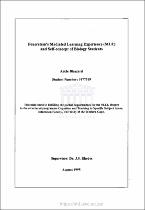Feuerstein' s Mediated Learning Experience (MLE) and Self-concept of Biology Students
Abstract
This study focuses on the underachieving student. In particular, it examines the effect on a group of underachieving biology students, drawn from three standard nine classes in a girls' secondary school in Elsies River, of a short but intensive period of mediated learning
experience. The study was designed to show whether Feuerstein's mediated learning experience (MLE) could improve the serf-concept of
biology students. The MLE intervention took the form of eight 45-minute sessions with the group of L0 students, with two sessions a
day over a period of four days. The sessions were designed in accordance with the essential, and some non-essential, criteria for MLE.
The intervention was preceded by a test of the serf-concept of the students, using the serf-concept inventory developed by Vrey & Venter (1983). Following the intervention, the students' self-concept was measured again, using the same instrument. A significant improvement was observed between the first and the second measurement of self-concept. In addition, the students were given an opportunity to give
their view of the intervention by means of the MLE rating scare developed by the cognitive Research Programme of the University of the Witwatersrand. All of the students reflected positively on the experience. The study provides evidence that those students whom teachers often give up on - or who give up on themselves are modifiable in the ordinary school setting through MLE. They can progress from being passive acceptors to active participants in the learning process, with a concomitant improvement in self-concept.

